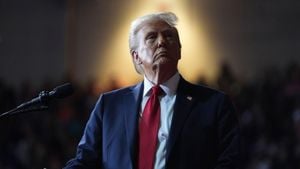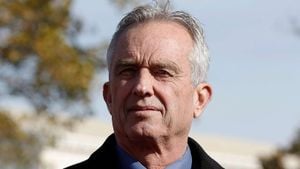Countries around the globe are converging on Baku, Azerbaijan, for the 29th United Nations Climate Change Conference, known as COP29. The summit has become the focal point for urgent negotiations surrounding climate finance, especially for vulnerable nations facing the brunt of climate change's impacts. The stakes have never been higher, as leaders grapple with how to meet the historic targets set forth in the 2015 Paris Agreement.
This year’s COP29 marks the self-imposed deadline for nations to establish the New Collective Quantified Goal for climate aid. Policymakers are expected to negotiate the amount of funding richer nations will provide to developing nations for both decarbonization efforts and climate change adaptation strategies. This includes defining what constitutes 'developing' nations and determining how aid should be delivered.
Historically, climate negotiations have struggled with commitment issues. A rather embarrassing detail emerges from past talks: the 2009 commitment of $100 billion annually by wealthy countries has yet to be fully realized, with many countries failing to meet the deadline. This unmet promise came two years late, and the funding provided mainly consisted of loans—often criticized for adding to debt burdens rather than offering the grants desperately needed by developing nations.
At COP29, negotiations are expected to be tense, as developed nations like the U.S. and the U.K. face off against nations like Somalia and Barbados over key details, including funding targets and what forms of assistance are acceptable. There’s significant debate about whether countries such as China and several oil-rich nations should continue to be considered developing nations, especially as their wealth levels have increased significantly over the past few decades. These tensions only add to the urgency of the discussions, as ministers are racing against time to draft concrete agreements amid economic uncertainties worldwide.
The climate crisis is often viewed through the lens of tragic irony. The nations most affected by climate disasters like droughts and floods are frequently the nations least responsible for carbon emissions. This injustice lies heavily on the minds of many negotiators at COP29. Poland's Agriculture Minister, via the Independent High-Level Expert Group on Climate Finance, stated emphatically, "Parties must realize the clock is ticking. They need to use this precious time to engage directly and develop bridging solutions."
Experts reiterate the need for substantial investments—around $6.5 trillion annually—by 2030 to tackle climate impacts adequately. A report issued at COP29 reinforces this figure, indicating the amount required reflects the multifaceted problems posed by climate change. Without this funding, nations face dire consequences, not just environmentally but economically, forcing them to bear even greater costs down the line.
“Investment across all economies is mandatory for climate action,” asserted the report. This sentiment echoes throughout the conference, where the pressure to reach concordance mounts as the deadline approaches. COP29 negotiators have highlighted their desire to learn from past mistakes—especially concerning the previous $100 billion issue, but skepticism looms large.
The discussions at COP29 have underscored the divisions far more than any cooperative spirit. Political tensions are heightened by the news of Donald Trump’s potential return to U.S. politics and the apprehension surrounding its impacts on climate action. Despite these fears, U.S. climate envoy John Podesta maintained confidence, stating, "The clean energy revolution will continue regardless of the political winds."
The challenges this conference faces abound, from technical dilemmas and conflicting national interests to diverse opinions on the definitions of climate aid. After intensive deliberations, negotiators finally presented a first draft decision text just days prior, encapsulating what would ideally guide the conferences. Significant issues were reintroduced, resulting in this document ballooning to thirty-six pages, as numerous contentious points remain unresolved.
Meanwhile, the reality for under-resourced nations is largely grim. They are already feeling the economic burden of climate change through loss and damage, and their representatives assert these costs must be shouldered by those who historically contributed most to the crisis. Sandra Guzman, director of the Climate Finance Group for Latin America and the Caribbean, voiced: "The issue isn't the availability of funds but rather the political willingness to allocate them where needed. If we cut fossil fuel subsidies, we could generate funding needed for climate initiatives. The political will is simply lacking at this juncture.”
This sentiment resonates with many developing nations who find themselves pleading for support from wealthier counterparts. The summit's discussions are set against the backdrop of not just environmental urgency but as moral imperatives. With climate-related disasters doubling down every year, the call to action grows louder. Nations need to stand up for those who will face extremes and enable transformative investments, not only to mitigate damage but to protect future generations.
With the clock ticking down to November 22, the conclusion of COP29, it's become imperative for delegates to set aside inherent differences and prioritize globally responsible decisions. The financial coherence needed could very well dictate the tangible solutions available to combat climate change moving forward. Perhaps what’s at stake is the mere survival of vulnerable communities across the globe.



